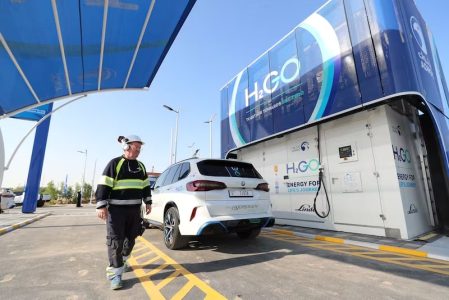Abu Dhabi clean energy company Masdar believes there is a “compelling business case” for using hydrogen to make air travel greener, a senior executive said on Monday.
Mohammad Abdelqader El-Ramahi, Masdar’s chief green hydrogen officer, said synthetic aviation fuels were a “low-hanging fruit” in the industry.
Airlines are banking on sustainable fuels to “drop in” to existing jet engines and cut the bulk of CO2 emissions caused by flying.
More radical remodelling of aircraft, involving electric batteries and alternative engines, is expected to take a smaller part of the slack.
Using hydrogen is an alternative to the most common type of sustainable fuel made from cooking oils and plant waste, of which supplies are limited.
This involves splitting hydrogen off from water (H2O), ideally using climate-friendly means such as wind or solar power, and combining it with CO2.

“One could say the 1.2 per cent is very low. It is not,” Mr El-Ramahi told a summit of green hydrogen investors in London.
“If you look at the current evolution of the aviation sector and you look at this quantity, this quantity is ginormous.”
He said biofuels would “not be able to scratch the surface” of the volumes of cleaner fuel needed, especially when competing with land needed to grow food.
Fines for failing to comply with EU rules also mean that an aviation company could end up paying double if it does not go down an eSAF route, he said.
“We believe that sustainable aviation fuels or eSAF synthetic fuels are one of the low-hanging fruits,” Mr El-Ramahi said. “It’s a very compelling business case.”
Aviation chiefs are also looking at burning hydrogen directly in jet engines, although these would need to be larger as it is less dense than traditional jet fuel.
Lower expectations
The London summit heard the market for green hydrogen – as it is known when it comes from renewable sources – has fallen short of optimistic predictions from a few years ago.
Insiders talk of a “chicken-and-egg problem” in which there is little demand for hydrogen until it is cheap, but it will not be cheap until there is enough demand to invest.
“We’re at an inflection point in terms of the growth of the market. The inflection is probably not going to be as steep as we would have expected two to three years ago,” said Felipe Arbelaez, a BP hydrogen executive.
“I think the ramp-up and the penetration of low-carbon hydrogen is definitely going to be a bit slower than the market would have anticipated two or three years ago.”
Sopna Sury, a hydrogen executive at German company RWE, said the focus of the industry was on “smaller, mid-size” business opportunities.
“There has been reality kicking in which I think is very healthy, because there was a lot of naivety four years ago,” she said.
Masdar told The National in May it hopes to beat a 2030 target of a million tonnes of green hydrogen production capacity.
The company intends to sell some hydrogen to UAE industries and export the rest as the world seeks alternative fuels in industries such as steelmaking, air travel and shipping.
“If you look at the legacy of Abu Dhabi in the past 50 years, you will see that we’ve always been pioneers, risk-takers,” Mr El-Ramahi said.
“We always like to be first movers and we pride ourselves on being one of the visionaries when it comes to the energy transition.”



